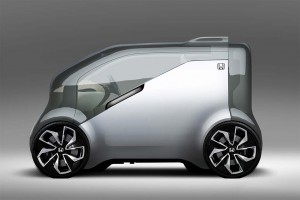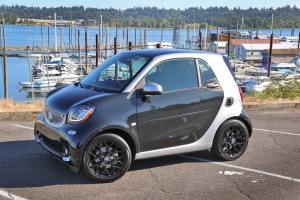
It may not be very exciting to look at, but the Honda NeuV concept can develop an emotional bond with its passengers.
Anyone who has struggled to merge lanes at a construction site might find the idea a little hard to swallow, but Honda is imagining what it calls a “cooperative mobility ecosystem” in which cars, if not necessarily their drivers, all work together to reduce highway congestion and improve vehicle safety.
The Japanese maker plans to present its vision – embodied in an “automated EV commuter vehicle” it’s calling NeuV – at the Consumer Electronics Show in Las Vegas early next month. Traditionally dedicated to smartphones, TVs and other gadgets, CES has become an increasingly important place of automakers to show and tell about their latest high-tech concepts.
In the case of Honda, it says its “The exhibit will include the NeuV, a concept automated EV commuter vehicle equipped with artificial intelligence (AI) called ‘emotion engine’ that creates new possibilities for human interaction and new value for customers.”
It’s apparently meant to take things to a new level beyond the bonds many folks are already forming with the likes of voice assistants such as Apple’s Siri and Amazon’s Alexa. That’s in line with what we’re already seeing from other Japanese automakers.
(Honda gives best look yet at new Civic Si. For more, Click Here.)
Rival Toyota, for one, recently began selling – in Japan only – a 4-inch-tall robot first used by a Japanese astronaut during his stint on the International Space Station. Dubbed Kirobo Mini, it’s designed to chat away and can even recognize a companion’s facial expressions. The little companion is able to recall its owner’s likes and dislikes and even remember places they have visited together.
Japanese makers have unveiled several other concept cars that supposedly can read a motorist’s emotions, even adjust interior lights to soften a bad mood. And European researchers working with PSA Peugeot Citroen displayed a concept several years ago able to read facial expressions to detect oncoming road rage, as well as when a driver grows tired or fatigued.
NeuV is a joint venture between Honda an Cocoro SB that was first announced last July. Exactly how far they’ll go with giving the car some sort of voice and emotions, well, we’ll have to wait and see, but one thing seems clear, it will be difficult to get very emotional about the basic design of the electric commuter car – which can best be described as a box on wheels.
(Honda Civic named best overall buy for 2017 by KBB.com. Click Here for the story.)
From the teaser image provided by Honda, NeuV is about the size of – and perhaps even a touch smaller than – the Smart Fortwo, but with an even more utilitarian design.
Whether there is any plan to actually put the two-seater into production remains to be seen. But one can expect to see voice assistants become a common presence in tomorrow’s vehicles. Hyundai recently announced it will team up with Amazon to harness the Alexa service. And Ford announced similar plans during CES last year. Many vehicles can now access Siri through a touch of the steering wheel, as well as the Android alternative.
Beyond artificial intelligence capabilities, expect to see more vehicles add connected car services that will tap into both vehicle-to-vehicle and vehicle-to-infrastructure systems. That should become all but ubiquitous as autonomous vehicles eventually start taking to the highways.
(To see what makers took top honors on U.S. News & World Report’s best brands list, Click Here.)
We’ll learn more about what Honda has in mind during its CES news conference on Jan. 5.


Yeah, I’m going in the other direction. I like it that my Alfa requires 100% of my focus when I’m driving it.